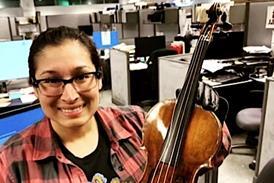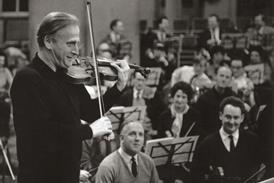- More from navigation items
- Home
- News
 International Society of Bassists names recipient of 2025 Jane Little Scholarship
International Society of Bassists names recipient of 2025 Jane Little Scholarship Winners announced for the 2025 Victoria ‘BCN’ International Violin Competition
Winners announced for the 2025 Victoria ‘BCN’ International Violin Competition LA police recover a stolen 331-year-old Grancino violin, worth $650k
LA police recover a stolen 331-year-old Grancino violin, worth $650k Violin of the Sea: the violin made from the wood of migrant boats blessed by Pope Francis
Violin of the Sea: the violin made from the wood of migrant boats blessed by Pope Francis
- For Subscribers
- Student Hub
- Playing Hub
- Podcast
- Lutherie
- Magazine
- Magazine archive
- Whether you're a player, maker, teacher or enthusiast, you'll find ideas and inspiration from leading artists, teachers and luthiers in our archive which features every issue published since January 2010 - available exclusively to subscribers. View the archive.
- Jobs
- Shop
- Directory
- Contact us
- Subscribe
- Competitions
- Reviews
- Debate
- Artists
- Accessories
Black America: A race for change

Still now, in the 21st century, black people are inadequately represented within classical music. Pauline Harding talks to string players in America about lingering social oppression and what the wider community can do to bring about progress
Many years have passed since decades of protest, culminating in the civil rights movement of 1954–68, put an end to legally sanctioned racial bias and segregation in the United States. In theory, we have left times of racial oppression long behind us, and yet one only has to look at classical music to see that something is still not right. According to the United States Census Bureau, in 2019, 13.4 per cent of the American population was ‘Black or African American alone’; another 2.8 per cent identified as ‘two or more races’. So why are these numbers so poorly represented on classical stages? ‘Our orchestras are less than two per cent black,’ says Afa Dworkin, president and artistic director of the Detroit-based Sphinx Organization, which works to improve representation of black and Latinx people in the arts. ‘In music schools and conservatoires, black musicians are represented at only three to four per cent.’ Audience representation is not much better, and yet, as violist Eliesha Nelson points out, orchestras in the States are non-profit organisations intended to serve the community. In Cleveland, Ohio, where in 2000 she was the first black female player ever to be hired by the Cleveland Orchestra, that community is 48.8 per cent black. ‘Whose lives are we enriching?’ she asks. ‘Is it OK that our audiences don’t really include those people, and that we don’t reflect them by telling their stories within this art form?’ The reason for the shortfall is not that all black people are somehow ‘new’ to classical music, lack talent or are ‘too poor’ to get involved, she emphasises: many wonderful black classical musicians of the past have simply been blocked and forgotten, as have the black music schools and orchestras that after the civil rights movement were overwritten by their better-supported white counterparts.
Of course, the situation has improved: to realise that, one need only ask black musicians today how their experiences compare with those of their parents. Cellist Astrid Schween, born in the ’60s, has been able to live her mother’s dream of becoming a professional musician – a dream that for many black women of the previous generation had been an impossibility. ‘My mom was a gifted pianist, but she left music to become a nurse,’ says Schween. ‘This was not what she had envisioned for herself.’ She was one of many who suffered similarly, in a field that denied her opportunity…
Already subscribed? Please sign in
Subscribe to continue reading…
We’re delighted that you are enjoying our website. For a limited period, you can try an online subscription to The Strad completely free of charge.
* Issues and supplements are available as both print and digital editions. Online subscribers will only receive access to the digital versions.
























